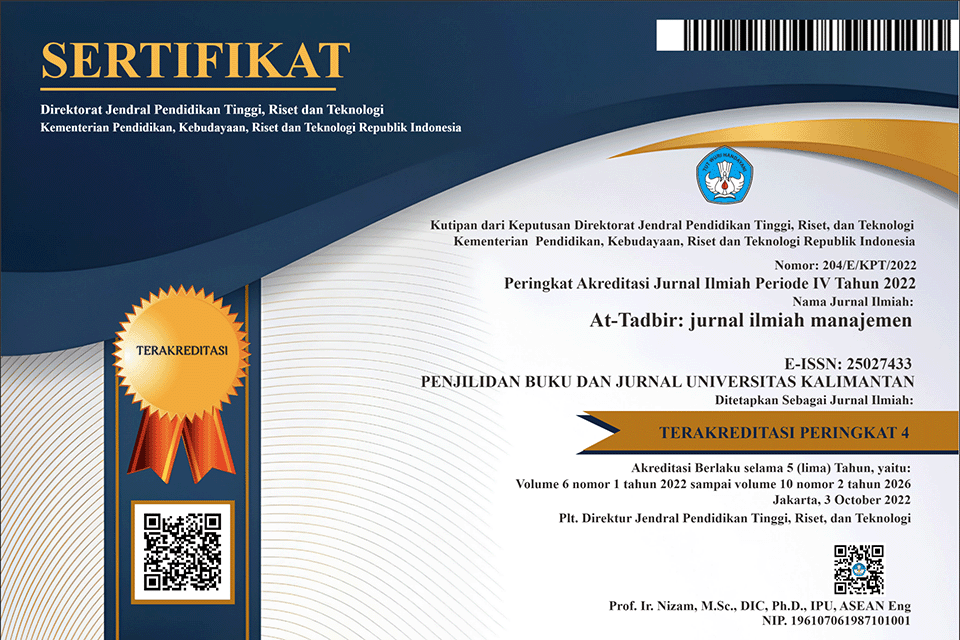Pengaruh Kepedulian, Pengetahuan, Sikap, Inisiatif Pemerintah, Tekanan Teman Sebaya Dan Spiritualitas Terhadap Niat Beli Produk Ramah Lingkungan Di Banjarmasin
(1) Universitas Lambung Mangkurat
(*) Corresponding Author
Abstract
This study aims to find out and analyze the influence of environment concern, environment knowledge, environmental attitude, government initiative, peer pressure, and spirituality on the purchase intention of environmentally friendly products among consumers in Banjarmasin environment. This research is a research with quantitative approach. The research data are obtained using questionnaires which are distributed to 168 respondents in Banjarmasin. Structural Equation Model (SEM) is a method of data analysis used in this study. The result of this study indicate that environment concern, environment knowledge, environmental attitude, and spirituality have significance influence on purchase intention of environmentally friendly products. While, government initiative and peer pressure have no significance influence on the purchase intention of environmentally friendly products.
Keywords : concern, knowledge, spirituality, purchase intention, environmentally friendly products
Full Text:
PDFReferences
Ajzen I. (1991). The theory of planned behavior: Organizational Behavior Human Decision Process, 50:179–211.
Chairy. (2012). Spirituality, Self Transcendence, and Green Purchase Intention in College Students. Procedia - Social and Behavioral Sciences, 57, 243 – 246.
Chen, T.B., & Chai, L. T. (2010). Attitude towards the Environment and Green Products Consumers Perspective. Management Science and Engineering, 27-39.
Chen,Y.S., & Chang, C.H. (2012). Enhance Green Purchasae Intentions. Management Decision, 50, 502-520.
Cherian, J. & Jacob, J. (2012). Green Marketing: A Study of Consumers’ Attitude towards Environment Friendly Products. Asian Social Science; 8(12).
Crosby, L. A., Gill, J. D. & Taylor, J.R. (1981). Consumer-voter behavior in the passage of the Michigan container law. Journal of Marketing, 45(2), 19-32.
Dunlap, R. E. & Jones, R. E. 2002. Environmental concern: conceptual and measurement issues. In Handbook of Environmental Sociology, Westport,CN: Greenwood Press.
Ghozali, I. 2011. Model Persamaan Struktural: Konsep dan Aplikasi dengan Program AMOS 19.0 Edisi 4, BP Universitas Diponegoro, Semarang.
Joshi, Y. (2016), Investigating the Influence of Spirituality, Environmental Concern and Ecological Knowledge on Consumers' Green Purchase Intention. Purusharta Journal, 9(2), 54-61.
Kasali, R. 2005. Sembilan Fenomena Bisnis, Manajemen Student Society, FEUI official Site
Karmarkar, U. R., & Bollinger, B. (2014). BYOB: How Bringing your Own Shopping Bag Leads to Treating Yourself, and the Environment. Boston, MA: Harvard Business School Press.
Kim, Y., & Choi, S. M. (2005). Antecedents of green purchase behavior: An examination of collectivism, environmental concern, and PCE. Advances in Consumer Research, 32, 592-599.
King JE & Crowther MR. (2004). The measurement of religiosity and spirituality. Journal of Organizational Change Management. 17, 83-101.
Laroche,M., Bergeron, J., Forleo, G.B. (2001). Targeting Consumers Who are Willing to Pay More for Environmentally Friendly Products. Journal of Consumer Marketing, 18(6), 503-520.
Lee, K. (2008). Opportunities for green marketing: Young consumers. Marketing Intelligence & Planning, 26(6), 573-586.
Leonidou, C.L, Leonidou, C.N, & Kvasova, O. (2010). Antecedents and Outcomes of Consumer Environmentally Friendly Attitudes and Behaviour. Journal of Marketing Management, 26, 1319-1344.
Ling, C.F. (2015). Factors Influencing Malaysian Consumers’ Purchase Intention on Enviromental Friendly Lighting Products in Malaysia. Thesis. Universiti Sains Malaysia, Penang
Marquis, C, J Zhang dan Y Zhou, (2011). “Regulatory uncertainty and corporate responses to environmental protection in China”, California Management Review, 54 (1): 39-63.
Mei, O.J., Ling K.C., & Hooi, K.K. (2012). The Antecedents of Green Purchase Intention among Malaysian Consumers. IPEDR, 38,39-43.
Mun, T.S. (2014). Factors That Influence Green Purchase Behaviour of Malaysian Consumers. Thesis. Faculty of Accountancy and Management, University Tunku Abdul Rahman.
Pavan, M. P. S. (2010). Green Marketing in India: Emerging Opportunities and Challenges. Journal of Engineering, Science and Management Education, 3, 9–14.
Piedmont R L. (1999). Does spirituality represent the sixth factor of personality? Spiritual transcendence and the five-factor model. Journal of Personality. 67, 985–1014.
Rashid, N.A. (2009). Awareness of Ecolabel in Malaysia’s Green Marketing Initiative. International Journal of Business and Management, 4(8), 132–141.
Ratnakar, R. & Nair, S. (2012). A Review of Scientific Research on Spirituality. Business Perspective and Research, July-December
Schultz, P. W., Shriver, C., Tabanico, J. J, & Khazian, A. M. (2004). Implicit connections with nature. Journal of Environmental Psychology, 24(1), 31-42.
Tripathi, V., Shukla, S.M., Saran, P.K. & Kumar, S. (2016). Purchase Intention Towards Eco-Friendly Electronic Products While Incorporating Mediating Influence of Brand Image. I J A B E R, 14(12) :8335-8348
Usmani, S., Kumari, K., Husain, J., Jamal, S. (2015). Consumer’s Perception and Purchase Intention towards Green Product : Exploring The Attitude Among Pakistani Consumers. Abstract of SOCIONITS 15
DOI: http://dx.doi.org/10.31602/atd.v4i2.3032
Refbacks
- There are currently no refbacks.
Copyright (c) 2020 Arafat Alhally
---------------------------------------------------------------------------------------------------------------------
At-Tadbir: Jurnal Ilmiah Manajemen is licensed under Creative Commons Attribution-Share A like 4.0 International License




